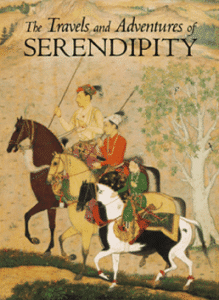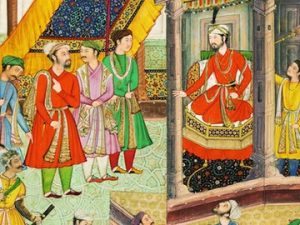قصه های زیبا ریشه در تمدن چند هزار ساله ایرانیان دارد. داستان سه شاهزاده از سرندیپ یک داستان اصیل ایرانی است که ترجمه انگلیس آن در ادامه می آید.
داستان سه شاهزاده از سرندیپ به انگلیسی
The Three Princes of Serendip
“In ancient times there existed in the country of Serendippo, in the Far East, a great and powerful king by the name of Giaffer. He had three sons who were very dear to him. And being a good father and very concerned about their education, he decided that he had to leave them endowed not only with great power, but also with all kinds of virtues of which princes are particularly in need.”
The father searches out the best possible tutors. “And to them he entrusted the training of his sons, with the understanding that the best they could do for him was to teach them in such a way that they could be immediately recognized as his very own.”
When the tutors are pleased with the excellent progress that the three princes make in the arts and sciences, they report it to the king. He, however, still doubts their training, and summoning each in turn, declares that he will retire to the contemplative life leaving them as king. Each politely declines, affirming the father’s superior wisdom and fitness to rule.
The king is pleased, but fearing that his sons’ education may have been too sheltered and privileged, feigns anger at them for refusing the throne and sends them away from the land.
The lost camel
No sooner do the three princes arrive abroad than they trace clues to identify precisely a camel they have never seen. They conclude that the camel is lame, blind in one eye, missing a tooth, carrying a pregnant woman, and bearing honey on one side and butter on the other. When they later encounter the merchant who has lost the camel, they report their observations to him. He accuses them of stealing the camel and takes them to the Emperor Beramo, where he demands punishment.
Beramo asks how they are able to give such an accurate description of the camel if they have never seen it. It is clear from the princes’ replies that they have used small clues to infer cleverly the nature of the camel.
Grass had been eaten from the side of the road where it was less green, so the princes had inferred that the camel was blind on the other side. Because there were lumps of chewed grass on the road that were the size of a camel’s tooth, they inferred they had fallen through the gap left by a missing tooth. The tracks showed the prints of only three feet, the fourth being dragged, indicating that the animal was lame. That butter was carried on one side of the camel and honey on the other was evident because ants had been attracted to melted butter on one side of the road and flies to spilled honey on the other.
one of the princes said
As for the woman, one of the princes said: “I guessed that the camel must have carried a woman, because I had noticed that near the tracks where the animal had knelt down the imprint of a foot was visible. Because some urine was nearby, I wet my fingers and as a reaction to its odour I felt a sort of carnal concupiscence, which convinced me that the imprint was of a woman’s foot.”
“I guessed that the same woman must have been pregnant,” said another prince, “because I had noticed nearby handprints which were indicative that the woman, being pregnant, had helped herself up with her hands while urinating.”
At this moment, a traveller enters the scene to say that he has just found a missing camel wandering in the desert. Beramo spares the lives of the three princes, lavishes rich rewards on them, and appoints them to be his advisors.
The story continues
The three princes have many other adventures, where they continue to display their sagacity, stories-within-stories are told, and, of course, there is a happy ending.
درباره ریشه کلمه سرندیپیتی در این مقاله صحبت کردیم.
I can translate the story “The Three Princes of Serendip” into Persian. It’s a fascinating tale of deduction and wisdom.
سه شاهزاده سرندیپ
«در دوران باستان در سرزمین سرندیپو، در خاور دور، پادشاهی بزرگ و قدرتمند به نام جعفر حکومت میکرد. او سه پسر داشت که بسیار برایش عزیز بودند. از آنجایی که پدری دلسوز بود و به تعلیم و تربیت آنها اهمیت زیادی میداد، تصمیم گرفت آنها را نه تنها با قدرتی عظیم، بلکه با هر نوع فضیلتی که شاهزادگان به ویژه به آن نیاز دارند، تربیت کند.»
پدر به دنبال بهترین مربیان ممکن میگردد. «و آموزش پسرانش را به آنها سپرد، با این شرط که بهترین کاری که میتوانند برایش انجام دهند این است که آنها را طوری آموزش دهند که بتوان بلافاصله آنها را به عنوان فرزندان خود او شناخت.»
وقتی مربیان از پیشرفت عالی سه شاهزاده در هنرها و علوم راضی میشوند، گزارش آن را به پادشاه میدهند. اما او همچنان به آموزش آنها شک دارد و هر کدام را به نوبت فرا میخواند و اعلام میکند که قصد دارد از زندگی کنارهگیری کند و حکومت را به آنها واگذار کند. هر یک از آنها مودبانه پیشنهاد را رد میکنند و بر خرد برتر و شایستگی پدر برای حکومت تأکید میکنند.
پادشاه خوشحال میشود، اما از ترس اینکه مبادا آموزش پسرانش بیش از حد محافظتشده و ممتاز بوده باشد، از اینکه آنها تاج و تخت را نپذیرفتهاند، خود را عصبانی نشان میدهد و آنها را از سرزمینش دور میکند.
شتر گمشده
به محض اینکه سه شاهزاده به خارج از کشور میرسند، با استفاده از سرنخها، یک شتر را که هرگز ندیدهاند، به دقت شناسایی میکنند. آنها نتیجه میگیرند که شتر لنگ است، از یک چشم نابیناست، یک دندانش افتاده، یک زن باردار را حمل میکرده و در یک طرفش عسل و در طرف دیگرش کره حمل میکرده است. وقتی بعداً با تاجری که شتر را گم کرده روبرو میشوند، مشاهدات خود را به او گزارش میدهند. تاجر آنها را به دزدی شتر متهم میکند و آنها را نزد امپراتور برامو میبرد و تقاضای مجازات میکند.
برامو از آنها میپرسد که اگر شتر را ندیدهاند، چطور توانستهاند چنین توصیف دقیقی از آن ارائه دهند. از پاسخهای شاهزادگان مشخص میشود که آنها از سرنخهای کوچک برای استنباط هوشمندانه ماهیت شتر استفاده کردهاند.
علف از سمتی از جاده خورده شده بود که کمتر سبز بود، بنابراین شاهزادگان نتیجه گرفته بودند که شتر از چشم دیگرش نابیناست. از آنجایی که تکههایی از علف جویده شده به اندازه دندان شتر روی جاده افتاده بود، آنها نتیجه گرفتند که این تکهها از شکاف باقیمانده از یک دندان افتاده، بیرون افتادهاند. ردپاها نشان میدادند که فقط سه پا رد انداختهاند و پای چهارم کشیده شده است، که نشان میداد حیوان لنگ است. اینکه یک طرف شتر کره و طرف دیگرش عسل حمل میکرده، آشکار بود، زیرا مورچهها به سمت کرهی آبشده در یک طرف جاده و مگسها به سمت عسل ریختهشده در طرف دیگر جذب شده بودند.
سخن یکی از شاهزادگان
در مورد زن، یکی از شاهزادگان گفت: «حدس زدم که شتر باید زنی را حمل کرده باشد، زیرا متوجه شدم که در نزدیکی ردپاها، جایی که حیوان زانو زده بود، رد یک پا قابل مشاهده بود. از آنجایی که کمی ادرار در همان نزدیکی بود، انگشتانم را خیس کردم و در واکنش به بوی آن، نوعی شهوت جسمانی احساس کردم که مرا متقاعد کرد ردپا متعلق به پای یک زن است.»
شاهزاده دیگر گفت: «حدس زدم که همان زن باید باردار بوده باشد، زیرا در نزدیکی آنجا رد دستهایی را دیدم که نشان میداد آن زن، که باردار بوده، هنگام ادرار کردن با دستان خود به خودش کمک کرده تا بلند شود.»
در این لحظه، مسافری وارد صحنه میشود و میگوید که یک شتر گمشده را در حال پرسه زدن در بیابان پیدا کرده است. برامو جان سه شاهزاده را نجات میدهد، پاداشهای سخاوتمندانهای به آنها میدهد و آنها را به عنوان مشاوران خود منصوب میکند.
ادامه داستان
سه شاهزاده ماجراهای بسیار دیگری دارند که در آنها همچنان هوشمندی خود را به نمایش میگذارند، داستانهایی در دل داستانها روایت میشود و البته، داستان با پایانی خوش به اتمام میرسد.
درباره ادبیات و آموزش ترجمه زبان انگلیسی قبلا صحبت کرده ایم. لینک های مرتبط در ادامه می آیند:

